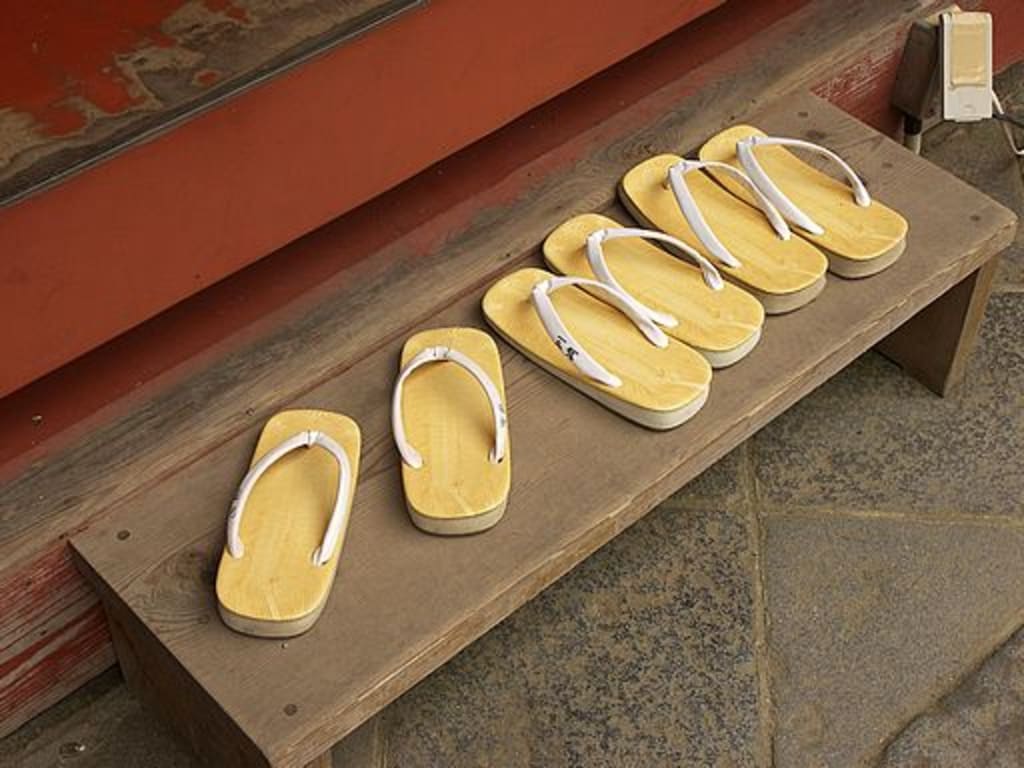
“Yukasama” is what I call her. Though I only refer to her by this name in my mind. And I’m sure if she knew this, she would give me that patient look, the same she gave me the one time I used this name with her in person, and would correct me again now, the same way she did then; “-san, not -sama.” In Japanese, the native language and culture of the woman I am writing about, the suffix “-sam” added after a name indicates the normal form and title “Mrs.” or “Miss.” However, add another syllable to the end of the normal form, making the suffix “-sama” at the end of a name, then the title of this person is raised by respect to mean something more along the lines of “sensai.” It’s a suffix title used to refer to those who are deserving of the utmost respect and status in Japan.
While adding this extra syllable to the suffix at the end of her name was very much my intention, she must have perceived it as simple mistake made by a young American boy with a sheltered upbringing. This perception alone is a testament to this woman’s humility. Not only is she my close friend, but also has become everything worthy of that formal title to me. Her intention was never to school me or teach me with life lessons or draw from her well of wisdom to dump onto my ignorant head. Her impact on me wouldn’t have been nearly as profound if she did. No, what inspiration I drew from her came from my simple observations as she purposely lived and acted the way she did.
To give some background, my friend, if you haven’t gathered already, was born and raised in Japan. I once asked about her family and growing up in Japan, trying to figure out what sort of upbringing had led my friend to the success and character as a human being she had obtained. She responded, “it was because I was raised by my parents who taught me that I had a contribution to make in this world.” Her mother and father did not come from privilege and struggled financially throughout their life. Her dad was a plantation worker, day after day striving in an oppressive heat, to make what roughly translated to $200 a month to support their small family. At that time, in the Japanese culture, the oldest son always had to give his money to the parents, and then his parents would give him an allowance for his family. My friend knew growing up that this was how things were and would be indefinitely.
Her parents would tell her “you are not going to have this life. You are going to the university and you are going to become somebody, and you are going to have another way of life, and not this plantation way of life.” Despite being told this, my friend expressed to me the concern and confusion she had, even as a young girl, “How were they going to do that? It costs to go to a university.” Her parents reassured her to not worry about the money, just worry about getting there. They would tell her to “be the best student that you can and do the best you can in school.”
My friend went to both the Japanese school and to the English school and did her best. When it was time for her to go to the university, she had no idea how her mother and father had the money for her tuition, but they did. She was accepted into university, studied hard and worked for her own personal needs at whatever jobs she could get. She did make it.
She discovered later on how her family came up with the funds to initially get her into university. As she related this story to me, she began by saying “you have to walk in my zori,” which essentially means ‘You have to walk in my slippers,’ “to understand what my life was like.” It was well into her university years, when she was home visiting family, she thanked her mom for having given her the opportunity for education and helping her to get to university. Her mom responded, “It was a family effort, you know.” My friend didn’t understand, her mom continued, “Your two brothers and Dad and I made slippers.” They sold those slippers for fifty cents a pair, despite probably being worth $2.50 or $3.00 on the market. They had saved the money from those slippers, and that was her tuition. My friend cried in learning this.
She didn’t know anything at the time. Her family didn’t say anything to her and would work while she was gone at primary school. Her two brothers would scrape the leaves and take the thorns off, then dry the leaf and roll it. Her dad would cut it into the size of the slippers and weave it, and her mother would sew the leaf on the pad. It was hard work. Years later she continues to be ever grateful and thank her still living brothers for their sacrifice.
Not long after finishing at university, she received a generous scholarship and came on a student visa to the United States. She earned a master’s degree from Harvard University and, with the emphasis on education instilled in her by her parents, she went on to earn Ph.D. in political science and government from the Massachusetts Institute of Technology. From there she fulfilled many prestigious and important roles in local, national, and even international government and programs. She has made strides in resolving specific social issues and has stood as a symbol of inspiration and tenacity with these various groups and organizations. She has lived a life of leadership and in all of her success has always sought out positions that would allow her to improve the world over serving herself. I won’t mention any specifics other than that here for a simple reason; it wasn’t any of that that made her inspirational in my eyes. In fact, it was only after a significant amount of time of knowing her and working with her that I learned all this myself. No, rather what inspired me about her was something else entirely.
I first met this woman while I was on a two-year voluntary service mission. I had just been moved to the Austin, Texas location. The work we did was engaging with a certain demographic and group of students that were attending University of Texas, Austin and Texas A&M University. We would seek out very specific students and get them more involved in our community program. Generally, these individuals were in underprivileged and minority groups, entailing that these individuals came with their own baggage and personal struggles. It was our responsibility to further involved members of this group that were less active and find other people to invite them to join.
This was hard work, but also very interpersonal and rewarding work. Often this work required us to get on real levels with people, get involved in the harsher parts of their life, and delve deep into individuals’ personal issues. We were busy, we were tired. All of the time. Some people we could never reach, despite efforts, and we would have to move on to other individuals.
This specific chapter, like all other chapters, was led by three community volunteers. These people had their own day jobs and were very much involved in their personal lives on top of this community responsibility. My friend, the one I have been writing about, was married to one of these leaders. By this time, her two children had grown up and had had children of their own. I met this woman well into her years as a grandma. In her old age, she had developed lupus and arthritis. I remember first meeting her. She was warm and welcoming, but not overpowering. She seemed to have an inside relationship with each of the young adults involved in this organization. She could tell you who was dating who, who was studying what, and what they really loved to eat. On one occasion, approaching the summer months, I noticed she was a bit preoccupied. “what’s on your mind?” I asked, worried that her illness had taken a turn for the worse. “I love summer,” she responded, “the weather gets warm which makes my arthritis not hurt so bad. What I don’t love are the bug boys that come here during the summer.” She was referring to those young men who came to the area to sell pest control door to door. “They come and spend the summer, make one of these girls fall in love with them and end up leaving them and breaking their heart once summer ends as if it didn’t mean a thing.”
Holding the position and responsibilities we did as part of this organization, we had access to information and records obtained from those who preceded us. These included notes on those who were not as involved with the organization that could benefit from being more involved and those who were completely uninvolved but whose name was still in the system. These people could range from people who had moved away, or even people that were no longer interested in participating. At times this latter reason could be due to offense that was received while participating, which in turn engendered bad feelings towards us and the organization. These notes were helpful to keep track of who we could help and who we should steer clear of.
One girl on this list was marked as “do not contact” for those bad feelings toward the organization I mentioned. In fact, the two that had tried to contact her before I arrived at this location were met with aggressive and angry words. I kept the name in mind and made a mental note to steer clear.
However, some months into being in this area, we received a text from my friend. “This girl is sick,” it said simply, “She would appreciate you guys coming over with me to help her do some housework and make some food.” The name of the girl this message referred to matched the name I had memorized. A warning went off in my head and my stomach dropped. I asked my friend if she had the right girl, mentioning that this girl is on our do not contact list. This girl herself asked not to be bothered by us again.
My friend responded, “I know, but she is my dear friend and is asking for our help.” Apparently, since this girl had left, my friend had been staying in touch via texting. Though she did so just as a friend, with no hidden agenda to get her back involved with the organization. “I don’t care about that. I care about her,” she said to our incredulity. The girl had begun to respond to my friend in kind and even allowed her to come visit from time to time. They developed a simple and genuine friendship. No ulterior motives attached. This was her private interactions with this girl until this girl herself, who once was jaded and offended by the organization, asked if we would come back into her life.
At the root of it, this is what our organization was all about. Though it was our job increase attendance and involvement, the purpose was to increase association and kindness throughout the community. My friend embodied that mission. These two instances were common happenings with her. Many people didn’t know about it, but she kept us posted on when we should get involved with someone. She did our job better than we ever could. The love for individuals and desire to share her life with them is what changed my life, not her resume. Despite her consistent personal suffering and illness, she was the happiest person there. She made the sun shine in Austin, Texas. It’s been years since I left there, but she is still hard at work doing what she has always done and couldn’t be happier or healthier for it.
About the Creator
Enjoyed the story? Support the Creator.
Subscribe for free to receive all their stories in your feed. You could also pledge your support or give them a one-off tip, letting them know you appreciate their work.






Comments
There are no comments for this story
Be the first to respond and start the conversation.